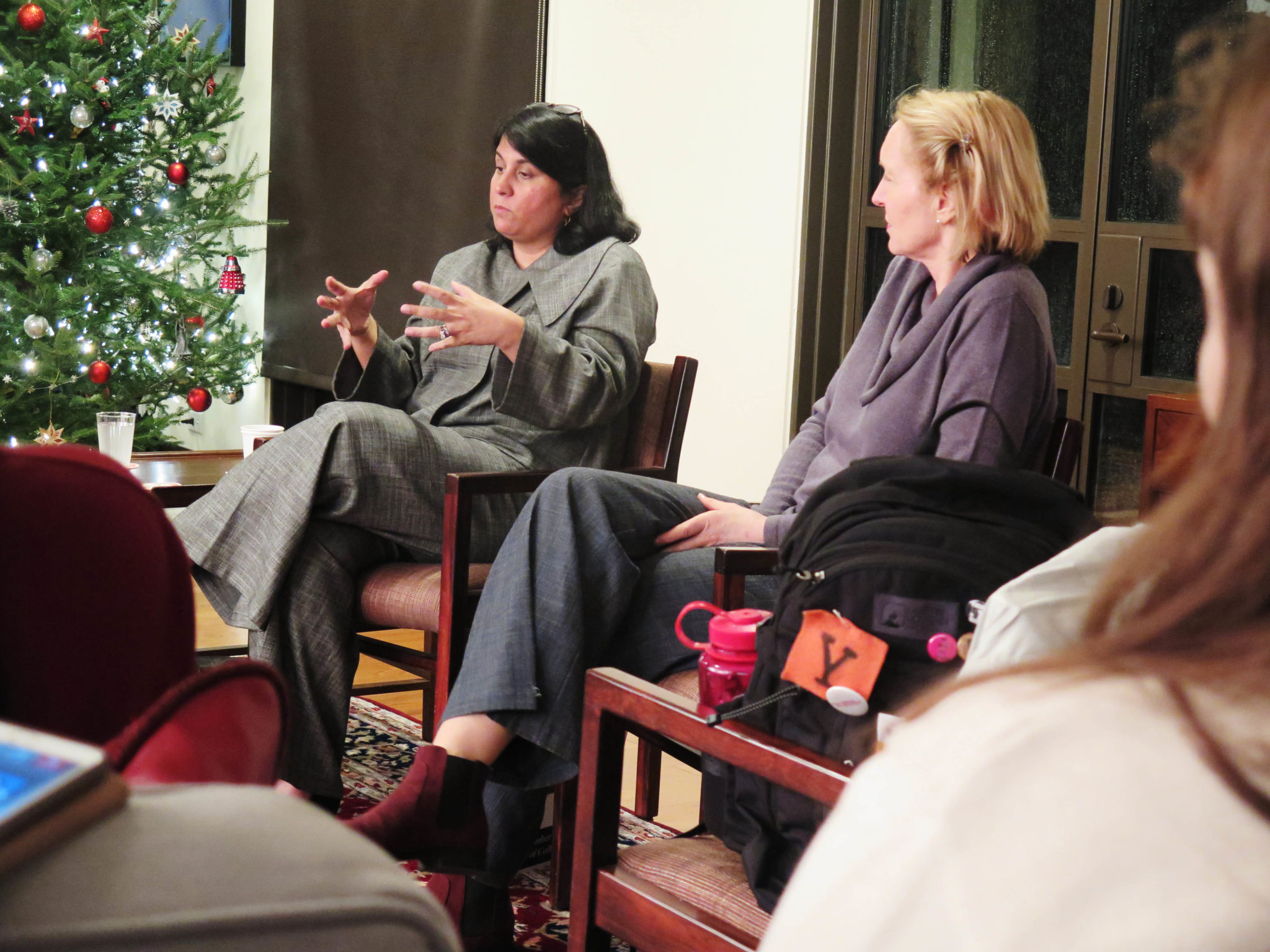
Around 25 students sat down in Morse College last Tuesday with Maya Ajmera, the author of a new book on international development and community growth, to discuss grassroots organizing and humanitarian aid.
Ajmera, whose book “Invisible Children: Reimagining International Development at the Grassroots” hit shelves this year, is also the founder of the Global Fund for Children and president and CEO of the Society for Science and the Public. The Morse College tea drew students from across disciplines, but many were currently enrolled in the anthropology course “Health Disparities and Health Equity,” taught by Morse Head Catherine Panter-Brick.
Over treats and tea, Ajmera recounted her career in medicine and writing, which began at Bryn Mawr College, where she studied neuroscience. But rather than becoming a doctor, Ajmera received a Rotary International Graduate Fellowship, and her post-graduation plans changed.
“It’s pretty extraordinary when someone gives you a chunk of cash and says ‘go to it,’” Ajmera said. “My professor said to me that if you really want to understand people — their aspirations, and what they care about — get a backpack and travel for a year. That is the best education you’re going to get.”
With the fellowship funding, Ajmera traveled from Thailand to Pakistan, discovering unique forms of local development led by small communities. She spoke about an encounter on one hot day in 1990 when, as hundreds of people tried to catch their trains in a small Indian town, she saw a group of 50 children sitting in a circle nearby.
In the center sat a teacher holding flashcards, instructing the students how to read and write. The teacher explained to Ajmera that the students came to makeshift school every day, where on Saturdays they also received a hot meal and a shower.
This inspired Ajmera to focus on international development, going on to earn a masters degree in public policy at Duke University. After taking several courses on economics, education, and public health, Ajmera came up with a system by which small amounts of capital could find their way into the hands of social entrepreneurs helping children.
She set about raising the capital herself, and approached Echoing Green — one of the country’s foremost social venture capital organizations — for funding. The interview with the firm was tense, but she ended up receiving funding.
“Frankly, in that interview, I thought that they thought I was not very bright, but I walked out of there and two days later, they gave me $100,000 and all I had was that and, as they said, my hallucinogenic optimism,” Ajmera said.
Capital, however, did not bring immediate success. One of Ajmera’s first ventures, the publication of “Children from Australia to Zimbabwe” — a book meant to generate the capital needed to invest in grassroots organizations — was rejected by every single publisher she sent it to.
Ajmera, who was only 25 at the time, found herself in a situation in which she had approximately $25,000 a year to fund her venture while also paying off her student debt and paying for assistance. She recalls that, with only $2,000 left in the bank, she had a choice to make.
She decided to self-publish the book with the help of donors. She also donated three copies to every public school in North Carolina and, once it rose in popularity, found a publisher that distributed the book nationally.
Banking on a mid-sized and well respected children’s book publisher, Charlesbridge, she helped craft an organization that has now published over 40 children’s books with a readership of 5 million. The organization’s first royalty check was invested in three local grassroots groups around the world.
After these initial investments, Ajmera and her three-person team found themselves traveling and scouting developing countries to find the next grassroots project to support.
“We were on the backs of trucks, we rode donkeys, we rode rickshaws, we went into slum areas, we talked to street children — the whole nine yards,” Ajmera recalled. “We wanted to find the most interesting gems of organizations and the important work that they were doing.”
And, indeed, her team found those gems. From Uganda, to the Philippines, to Washington, D.C., grassroots organizations flourished under her assistance. To date, the Global Fund for Children has invested nearly $40 million in over 600 community-based organizations in 80 countries touching the lives of over 10 million children.
The importance of the talk was clear among students. Sierra Baer ’18, who is enrolled in Panter-Brick’s class, drew a comparison between Ajmera’s incredible story and the class in which she is enrolled.
“It aligns perfectly because we’ve read [Ajmera’s] work in class and we’re discussing it most of this week,” Baer said. “She’s such a huge player in this game.”
As a student in Panter-Brick’s class, she emphasized the importance of Ajmera’s approach as she looks at public health and wellness issues through a perspective that combines the biocultural framework of medical anthropology and the issues of a global world. The Global Fund for Children’s empowerment of local grassroots organizations, most of which know the target communities better than any larger entity, increases the efficiency with which those organizations can intervene in public health and overcome localized challenges.
Rishi Mirchandani ’19, who was not in the anthropology class, said he attended the tea because of the incredibly unique perspective that Ajmera had to offer. As a woman who could have gone into a larger bureaucracy after obtaining an extensive background in international relations, public policy, public health and economics, Ajmera made a different choice, he said.
“I think that it’s really cool to talk to someone who’s worked at the grassroots level because we’re literally in a bubble of extremely elite resources,” Mirchandani said. “Unless you make a conscious effort to meet people who have gone outside of that, you don’t really gain awareness of what it’s like to spread grassroots’ change.”
Ajmera was the CEO of the Global Fund for Children for 18 years.







